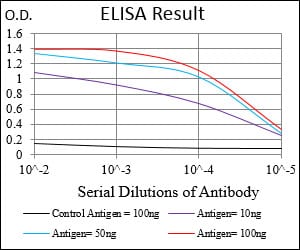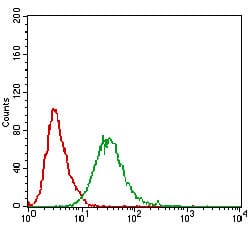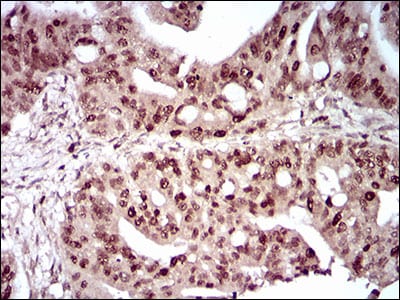


| WB | 咨询技术 | Human,Mouse,Rat |
| IF | 咨询技术 | Human,Mouse,Rat |
| IHC | 1/200 - 1/1000 | Human,Mouse,Rat |
| ICC | 技术咨询 | Human,Mouse,Rat |
| FCM | 1/200 - 1/400 | Human,Mouse,Rat |
| Elisa | 1/10000 | Human,Mouse,Rat |
| Aliases | ZIP; ZIPK |
| Entrez GeneID | 1613 |
| clone | 2H1D11 |
| WB Predicted band size | 52.5kDa |
| Host/Isotype | Mouse IgG1 |
| Antibody Type | Primary antibody |
| Storage | Store at 4°C short term. Aliquot and store at -20°C long term. Avoid freeze/thaw cycles. |
| Species Reactivity | Human |
| Immunogen | Purified recombinant fragment of human DAPK3 (AA: 28-161) expressed in E. Coli. |
| Formulation | Purified antibody in PBS with 0.05% sodium azide. |
+ +
以下是关于DAPK3抗体的3篇代表性文献(注:文献信息为示例性概括,具体内容需通过学术数据库核实):
1. **文献名称**:*"DAPK3 modulates mitochondrial homeostasis and regulates lung cancer metastasis"*
**作者**:Wang, Y. et al.
**摘要**:探讨DAPK3通过调控线粒体功能抑制肺癌转移的机制,利用特异性抗体验证DAPK3在肿瘤组织中的低表达及其与预后的相关性。
2. **文献名称**:*"A novel monoclonal antibody targeting DAPK3 for detection in human tissues"*
**作者**:Suzuki, T. et al.
**摘要**:报道一种高特异性DAPK3单克隆抗体的开发,通过免疫印迹和免疫组化验证其在多种癌症样本中的检测效果,证实其作为诊断工具的潜力。
3. **文献名称**:*"DAPK3-mediated autophagy regulation in vascular smooth muscle cells"*
**作者**:Kim, H. et al.
**摘要**:研究DAPK3在血管平滑肌细胞自噬中的作用,使用抗体检测其表达水平变化,揭示其通过mTOR通路影响动脉粥样硬化进程。
建议通过PubMed或Google Scholar以关键词“DAPK3 antibody”、“DAPK3 function”进一步检索最新文献。
Death-associated protein kinase 3 (DAPK3), also known as ZIP kinase, is a serine/threonine kinase belonging to the DAPK family, which plays critical roles in apoptosis, autophagy, and cellular stress responses. Structurally, DAPK3 contains a kinase domain, a calmodulin-binding regulatory domain, and a cytoskeletal binding region, enabling its participation in diverse signaling pathways. It regulates processes such as cytoskeletal reorganization, transcriptional regulation, and cell death through interactions with substrates like myosin light chain, p53. and PAR-4.
DAPK3 is implicated in various pathological conditions, including cancer, neurodegenerative diseases, and cardiovascular disorders. In cancer, it often acts as a tumor suppressor, with reduced expression linked to tumor progression and metastasis. Conversely, its dysregulation in neurodegenerative contexts may contribute to neuronal death. Antibodies targeting DAPK3 are essential tools for studying its expression, localization, and activity in tissues or cell lines. They enable detection via techniques like Western blot, immunohistochemistry, and immunofluorescence, aiding in the exploration of its role in disease mechanisms or therapeutic targeting. Specific DAPK3 antibodies also help dissect phosphorylation-dependent signaling crosstalk, providing insights into its regulatory networks. The development of phospho-specific antibodies further allows researchers to monitor activation states under varying physiological or pathological conditions.
×